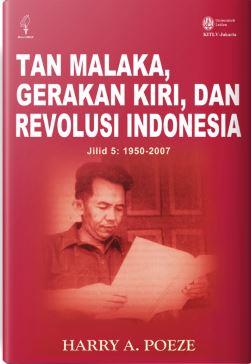


Books in series

Tan Malaka, Gerakan Kiri, dan Revolusi Indonesia
Jilid 1 Agustus 1945-Maret 1946
2008

Tan Malaka, Gerakan Kiri, dan Revolusi Indonesia
Jilid 2: Maret 1946 - Maret 1947
2009

Tan Malaka, Gerakan Kiri, dan Revolusi Indonesia Jilid 3
Maret 1947-Agustus 1948
2010

Tan Malaka, Gerakan Kiri, dan Revolusi Indonesia Jilid 4
September 1948 - Desember 1949
2014

Tan Malaka, Gerakan Kiri, dan Revolusi Indonesia, Jilid 5
1950-2007
2020
Authors

Harry A. Poeze is a senior researcher at KITLV working on the Project ‘Dutch Military Operations in Indonesia 1945-1950’ in a general supervisory and advisory capacity, contributing his expertise on developments in Indonesian politics and the Indonesian armed forces. Harry studied Political Science at the University of Amsterdam, where he graduated in 1972. In 1976 he obtained his PhD in Social Sciences at the University of Amsterdam with a thesis on the biography of the Indonesian political leader Tan Malaka. At that time Harry was an alderman in the local government of Castricum. Later he became head of the KITLV Publications Department (1981), which has since developed into the KITLV Press. Since 2010 he was senior publisher with the Press, and now, in retirement, a senior researcher at KITLV. His research interest is in the developments in the Indonesian political world since 1900, during Dutch colonial rule, the Japanese occupation, and the Indonesian Revolution in particular. He published a three-volume history of the Indonesian Left during the Indonesian Revolution, concentrating on the role of Tan Malaka, in 2007. Currently he is working on a publication about Indonesian political songs (1925-1965), the (revised) biography of Tan Malaka till 1945, and a monograph on Boven-Digoel, the Dutch colonial internment camp for political prisoners.

Tan Malaka (1894 - February 21, 1949) was an Indonesian nationalist activist and communist leader. A staunch critic of both the colonial Dutch East Indies government and the republican Sukarno administration that governed the country after the Indonesian National Revolution, he was also frequently in conflict with the leadership of the Communist Party of Indonesia (PKI), Indonesia's primary radical political party in the 1920s and again in the 1940s. A political outsider for most of his life, Tan Malaka spent a large part of his life in exile from Indonesia, and was constantly threatened with arrest by the Dutch authorities and their allies. Despite this apparent marginalization, however, he played a key intellectual role in linking the international communist movement to Southeast Asia's anti-colonial movements. He was declared a "hero of the national revolution" by act of Indonesia's parliament in 1963.